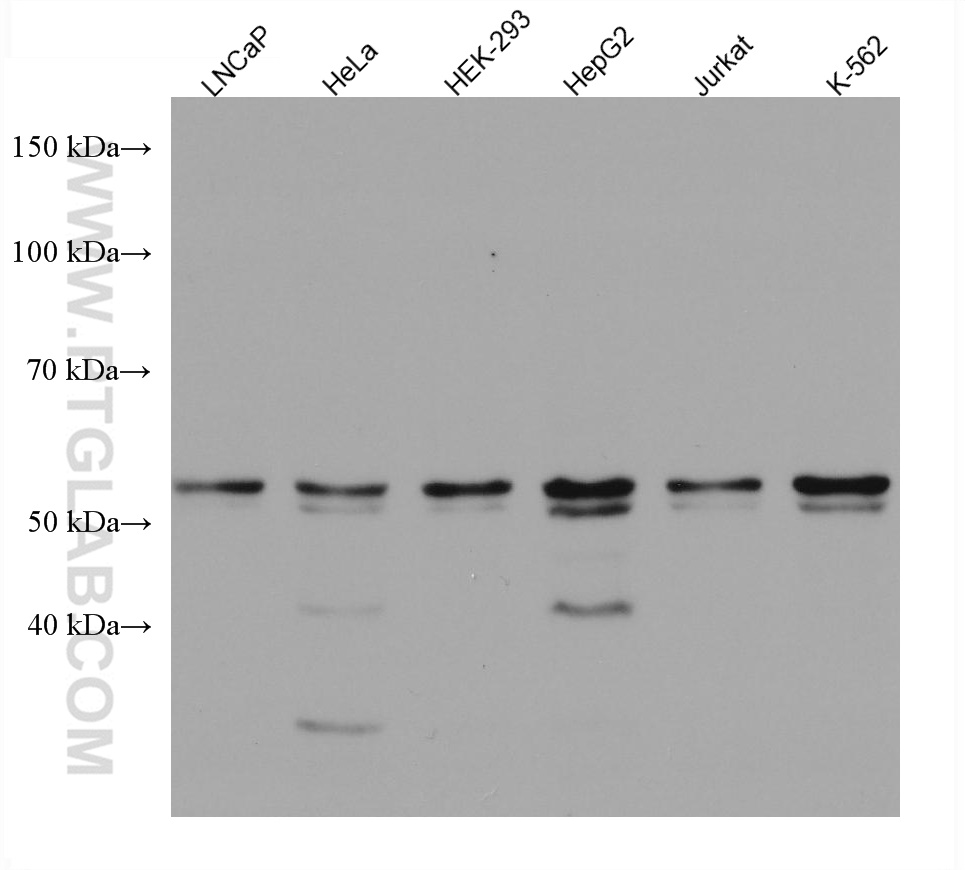验证数据展示
经过测试的应用
| Positive WB detected in | LNCaP cells, HeLa cells, HEK-293 cells, HepG2 cells, Jurkat cells, K-562 cells |
推荐稀释比
| 应用 | 推荐稀释比 |
|---|---|
| Western Blot (WB) | WB : 1:2000-1:10000 |
| It is recommended that this reagent should be titrated in each testing system to obtain optimal results. | |
| Sample-dependent, Check data in validation data gallery. | |
产品信息
67673-1-Ig targets RNMT in WB, ELISA applications and shows reactivity with Human, mouse samples.
| 经测试应用 | WB, ELISA Application Description |
| 经测试反应性 | Human, mouse |
| 免疫原 | RNMT fusion protein Ag6953 种属同源性预测 |
| 宿主/亚型 | Mouse / IgG1 |
| 抗体类别 | Monoclonal |
| 产品类型 | Antibody |
| 全称 | RNA (guanine-7-) methyltransferase |
| 别名 | DKFZp686H1252, hcm1p, hCMT1, hCMT1c, hMet, KIAA0398, MET, mRNA cap methyltransferase, RG7MT1, RNMT |
| 计算分子量 | 476 aa, 55 kDa |
| 观测分子量 | 55 kDa |
| GenBank蛋白编号 | BC036798 |
| 基因名称 | RNMT |
| Gene ID (NCBI) | 8731 |
| RRID | AB_2918497 |
| 偶联类型 | Unconjugated |
| 形式 | Liquid |
| 纯化方式 | Protein A purification |
| UNIPROT ID | O43148 |
| 储存缓冲液 | PBS with 0.02% sodium azide and 50% glycerol , pH 7.3 |
| 储存条件 | Store at -20°C. Stable for one year after shipment. Aliquoting is unnecessary for -20oC storage. |
背景介绍
RNMT, also named as mRNA cap guanine-N7 methyltransferase or KIAA0398, is a 476 amino acid protein, which contains one mRNA cap 0 methyltransferase domain and belongs to the class I-like SAM-binding methyltransferase superfamily. mRNA cap 0 methyltransferase family. RNMT localizes in the nucleus and is widely expressed in various tissues. RNMT as a mRNA-capping methyltransferase that methylates the N7 position of the added guanosine to the 5'-cap structure of mRNAs and binds RNA containing 5'-terminal GpppC.
实验方案
| Product Specific Protocols | |
|---|---|
| WB protocol for RNMT antibody 67673-1-Ig | Download protocol |
| Standard Protocols | |
|---|---|
| Click here to view our Standard Protocols |
